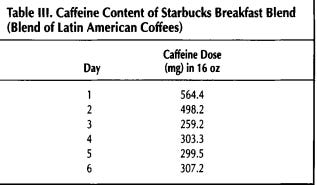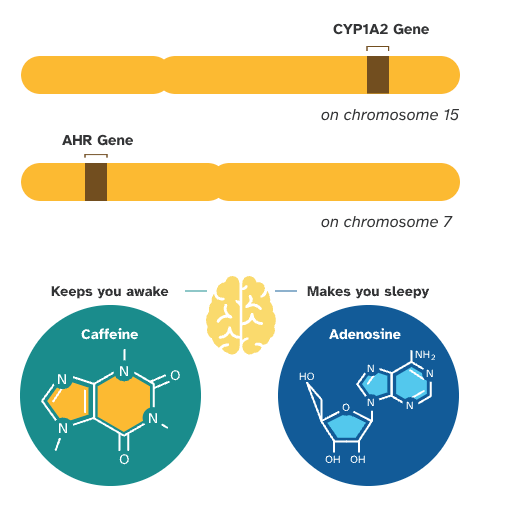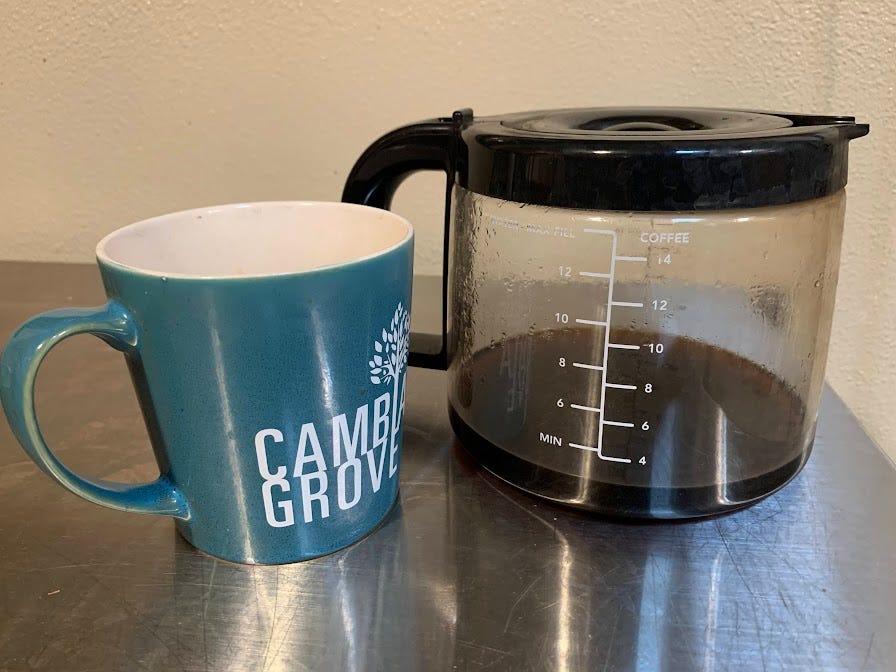Although I suspect I enjoy more coffee than the average person, I’ve never considered myself an extreme or even heavy drinker: three, maybe four cups a day? It’s time to be precise with how much I’m drinking and how it affects me.
How Much Caffeine do I Consume, Really?
For the past several years I’ve been enjoying my $200 9-Cup Oxo coffee maker. The markings on the water tank are measured in “cups”, but I can’t imagine starting my day with the dinky volume they call a single “cup”. Generally I set it to make about 6 cups, which I’ll sip throughout the morning and into the afternoon. I drink it from a mug that is — I’ve measured it — exactly 16 oz, or two cups. So as far as I’m concerned, I drink 3 cups a day. That’s not too much, is it?
When people discuss a "cup" of coffee, it can be somewhat confusing because the term “cup” doesn't always correspond to the same volume. This is especially true when it comes to coffee makers. A “cup” according to many coffee makers is not the same as a standard US cup (which is 8 fluid ounces). In many coffee makers, like mine, a “cup” is actually 5 to 6 fluid ounces.
As for the caffeine content, the amount can vary depending on factors like the type of coffee bean, how strongly it's brewed, and the specific brewing method used. That said, the most common estimate is roughly 90mg per 8 oz cup, apparently based on USDA measurements. Starbucks says their medium-roast Pike Place Roast (Tall, aka 12 oz) is 235 mg. By comparison, a can of Red Bull is listed as 80 mg, a regular Coke is about 34 mg and a Diet Coke is 42 mg — about the same as an 8 oz cup of green tea.
In my case, my coffee maker defines a "cup" as 5 fluid ounces, so if I make 6 cups/day, then I’m drinking about 30 ounces total.
One of my go-to brands of coffee is Peet's Major Dickason's Blend, which the manufacturer claims brews into about 133mg of caffeine in an 8-oz serving, or just under 17mg per ounce. Since my coffee maker's “cup” is 5 oz, then each "cup" contains: 16.69 mg/oz * 5 oz = 83.45 mg of caffeine
When I brew and drink 6 “cups”, the total caffeine I’m ingesting would be:
83.45 mg/cup * 6 cups = 500.7 mg of caffeine
This is well over the FDA's suggested maximum daily intake of 400mg for most healthy adults. Should I be worried?
How Accurate are those Caffeine Amounts?
But these estimates require me to trust — what? — something the manufacturer submitted — to who? It’s not like the US FDA or any other government body requires anyone to measure these caffeine amounts. The US Department of Agriculture maintains a large food database, updated regularly, in which “Brewed Coffee, breakfast blend” is labeled as 91mg in one cup (8 oz). The people at the excellent Caffeine Informer (which we covered in (230504 Non Standard Treatments) has a whole page describing the difficulty in accurately assessing caffeine levels.
As far as I can tell, the caffeine numbers I cited above are based on some combination of long-ago lab tests, good guesses, and random number generation. When some U of Florida scientists used gas chromatography to study their local Starbucks drinks, differences ranged from 260 - 560 mg, depending on the day. (Note: > 400 mg is considered dangerous)

If you have some ethyl acetate (aka nail polish remover) and a few other high school lab type supplies, read these instructions for how to measure it yourself.
Other than that, I think we have to go on some level of intuition: make the calculations using the best estimates like I did, and then adjust depending on how you feel drinking at those levels.
Genetics of Caffeine Metabolism
Meanwhile, can I be more precise with how caffeine affects me? The genetics of caffeine consumption has been well-studied. According to 23andme, I have the genotype C/C at rs4410490 and C/C at rs2472297. These are pretty common genotypes, found in between 66% of Asians and 85% of Europeans.

Another important one is the “slow metabolizer” genotype at rs762551. Cyclists with A/A, apparently perform better after ingesting caffeine. There’s no apparent difference, though, in people like me (A/C).
But all these associations are weak. Is it more likely that as-yet understudied microbes might play a bigger role in caffeine metabolism. Some insects are known to harbor species of Pseudonomas in order to detoxify caffeine that some plants evolved to resist predation. My various microbiome tests show that I have some of these microbes in me. Is it possible they’re doing some of the work that the genes aren’t? Who knows?
Meanwhile, I think I’ll try to limit my coffee intake for the next few weeks and see if anything changes.
About Personal Science
To really understand the world around you, stop thinking of yourself as a statistic in some scientific study. You’re not a statistic, you’re you. Don’t leave it to professionals. Because only you know the data that really matters to you, science should be personal.
That's why it's personal — it's about the one, unique data point that is you -- and why it’s science — using the quantitative tools of science to better understand your own situation, for yourself.



